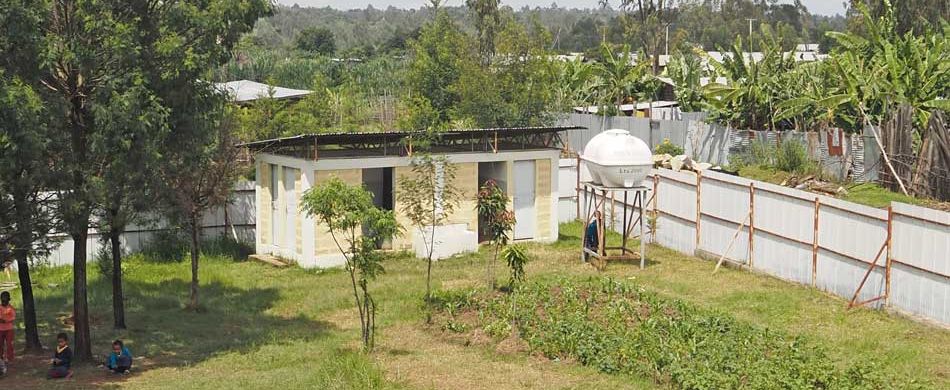Better Hygiene
MASORIA of Guncirè is a small village in the region of Guraghe, Ethiopia. It sits at an altitude of over 2,000 metres, some 200 kilometres to the south of Addis Abeba, the capital. It is one of the poorest zones in the whole of Ethiopia. The population lives mostly in wooden thatched huts called Tucul or in simple one-room houses made of mud, wood and sheet metal. They live through rearing goats and cows, and the cultivation of ‘false’ banana trees to produce a local staple called Cocio which, although poor in nutrients, is particularly essential in the long dry periods. Shops that sell a bit of everything only exist in larger villages.
The Beata Maria Rosa Pellesi nursery school in Masoria di Guncirè, named after the Italian nun beatified by Pope Benedict XVI in 2007, is one of five nursery schools run by the Franciscan Missionary Sisters of Christ in Ethiopia. The school, which has been maintained well, provides nursery education to 150 children. But the school toilets were a problem as there was no aseptic tank and no system for storage and distribution of potable water. “For this reason it wasn’t possible for the children to attend school for more than a couple of hours,” explains Sister Lujina Gebrewold, the Regional Superior of the Order. Together with Associazione Nuova Famiglia based in Padua, Italy, who have supported some of the children through distance adaption, the Sisters developed a project to carry out various works to finally complete the school.
Pluralist association
The Franciscan Missionary Sisters of Christ was founded in Rimini in 1885 by Mother Teresa Zavagli, and the first five Italian missionary Sisters arrived in Ethiopia in 1972. “Our socio-pastoral activities include health centres and services; reception and education of girls from the Gumuz people (in their patriarchal society, education for girls is not considered); pastoral care for young people and adolescents; visits to the poorest, and much more because we serve society by ‘looking around us’ just as our founder did,” explains Sister Lujina.
Associazione Nuova Famiglia was founded in 1994 as a secular and pluralist association. Its core commitment is the defence of the fundamental rights of children in all its meanings. It is managed entirely by volunteers, and seeks to provide remote help for construction projects for clinics, schools, and other infrastructure related to people. It currently operates in Tanzania, Guinea-Bissau, Brazil, as well as in Ethiopia.
€53,650 given
The proposed project would cover various construction works. “The existing bathroom block needed to be completed from a masonry point of view, including strengthening the foundations and putting down new flooring,” says Sister Seblewangal Kinfe, the school director. “It also needed an organic septic tank to take the dirty water from the toilets.” The other aspects of the works included a new plumbing system that would guarantee the availability of potable water during school hours; replacement of the electrics so that everything would be safe, together with some extra lighting; and finally a new small kitchen in accordance with regulations mandated by the government in all schools so that a meal can be prepared for the children together with a covered space for outside activities. “This meal can often be the only meal the children get in the whole day,” explains Sr. Seble.
The total cost of the proposed project came to around €73,000. The Associazione Nuova Famiglia took on the cost of the electrical works, and further local contributions reduced the amount requested from St. Anthony’s Charities to €53,650 which was then approved.
Three instalments
The first instalment was received in December 2022. The rising costs and scarcity of construction materials in Ethiopia in general were noted almost immediately, with prices rising monthly. There were also some transport delays due to riots in both the Guraghe and Oromia regions. But it was possible to obtain the majority of the supplies needed, and work began in January 2023. Acquisitions included both of the water tanks required for the new potable water supply.
The second instalment arrived in April 2023. The price of construction materials continued to rise monthly. Work began on building the new kitchen together with a covered veranda, the electrics were put in place, as were the waste-water pipes and septic tank.
The third and final instalment was received in June. Final works were carried out on the kitchen, including painting the interior. All remaining work was completed by mid July, and the project was able to remain within budget.
Multiple benefits
Now that the works are complete, not only will the 150 children at the school benefit from having potable water, but also the mothers of the children who will be able to fill their water tanks each day. Of course, there are also the new functional toilets. Outside of school hours, the new facilities may also be used for parent meetings, community events, and a group of 30 women taking part in a microcredit project organised by Associazione Nuova Famiglia.
The two teachers and two assistants at the school sent their thanks to the readers of the Messenger of Saint Anthony. They’re extremely happy with the work that’s been done, and in particular for the water that will help the children with hygiene. Sister Seble, the school director, took pen to paper: “First of all, I want to greet you with the Franciscan greeting of Pace e Bene – meaning ‘peace and all good’. Our school now has another beautiful aspect to it because the kids now have clean water and the kitchen is shiny and new. Thank you from the bottom of our hearts from the whole community. The Lord will compensate you with his infinite gifts.”



